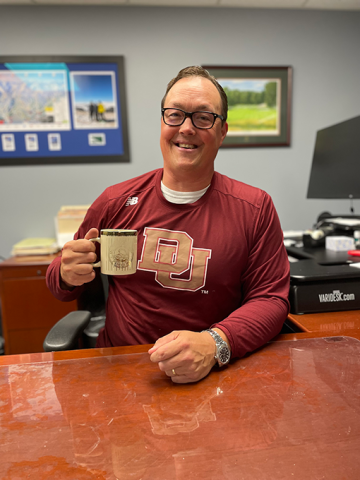Alum Now Sees Son Benefitting from the Program that Changed His Life
When Scott Kidder (BBA ‘95) arrived at the University of Denver, he says it was a sink or swim situation.
DU was the fifth college at which he had enrolled, and he knew it was his last shot at obtaining the college degree that would allow him to pursue his dream of joining his family’s business.
Kidder didn’t just stay afloat at DU, he thrived. He says his success was in large part thanks to DU’s innovative Learning Effectiveness Program (LEP), which has supported neurodiverse students and those with learning differences for the past 40 years.
“I’m still kind of shocked that I graduated from college,” Kidder says. “Everywhere else that I went, I just didn’t have the support that I needed. LEP provided me with a place where I felt like someone had my back.”
The person who had his back was his LEP academic counselor, Linda. Kidder says Linda not only taught him how to study and write effectively, but she also instilled confidence, which has been critical to both his personal and professional success.
“My high school guidance counselor told me that college was not for me. Now, tell me I can’t do something, and I will do it,” Kidder says.
Today, Kidder is President and CEO of his family’s business, Colonial Adjustment, Inc., a claims adjustment company.
“Every morning, I drink out of a coffee cup that Linda gave me at my DU graduation,” he says. “There’s not a day that goes by that I’m not grateful for what DU and LEP did for me.”
As LEP celebrates its 40th anniversary this year, Kidder’s son Jack is now benefiting from the program.
A transfer student like his dad, Jack struggled academically, despite having a great work ethic. “The outcomes were not matching his effort,” Kidder says. “Now, at DU, he is excelling.”
LEP Director and DU alum Jim Bailey (BS ’83) says he loves hearing LEP success stories like the Kidders’.
A former longtime educator and high school principal, Bailey came out of retirement to work at the LEP, first as an academic counselor and now as its director.
“I love working with neurodiverse students. They have to work so hard, and the tenacity with which they attack academics is inspiring,” Bailey says.
As Bailey reflects on the program’s past 40 years and thinks about what the next 40 might look like, he says, “We’re really thinking about: How do we expand our reach? How do we support neurodiverse and learning-different students not just at DU, but across the country?”
Today, the program is at capacity, serving over 350 students.
LEP is funded by participant fees; additionally, donations support program enhancements and scholarships so students with financial need can have access to the supports LEP offers. Bailey says donors are critical in maintaining and expanding access to students who benefit from services the LEP provides.
To learn about how your gift in support of scholarships can make a difference in the lives of LEP students like Scott and Jack Kidder, contact ScholarshipGiving@DU.edu. To make a gift in support of LEP, click here.








